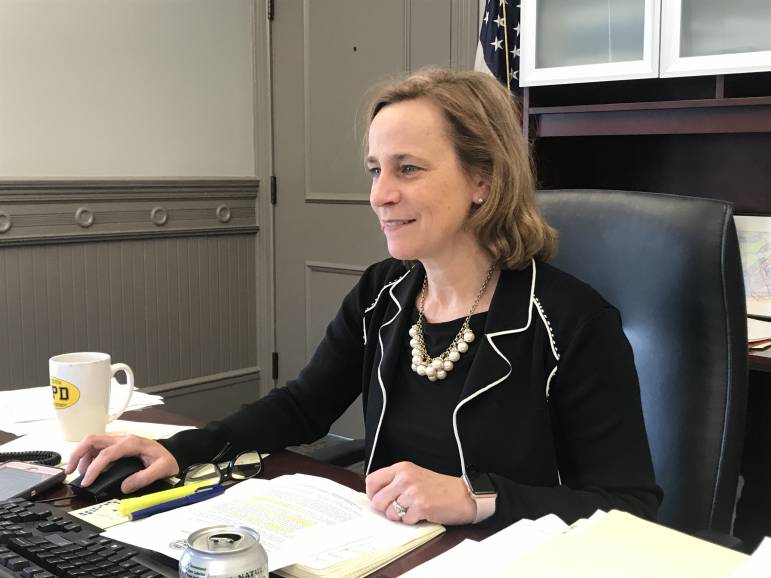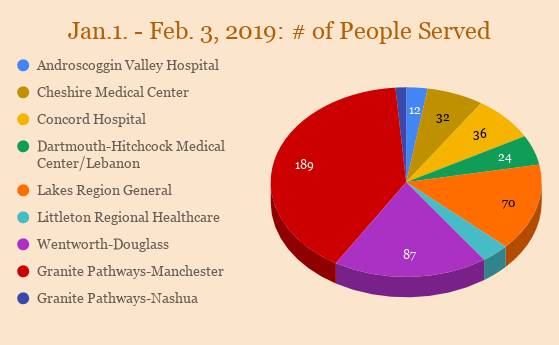
MANCHESTER, NH – Three months after the launch of statewide addiction “doorways,” the Queen City is still overburdened with the plurality of patients.
Data provided by the state Department of Health and Human Services shows that Granite Pathways in Manchester, the authorized “hub” for the city under the new hub-and-spoke model known as The Doorway, served 189 people who physically showed up seeking help with substance use disorder between Jan. 1 and Feb. 3.
From Feb. 4 to March 3, it saw 177 people, and from March 4 to March 31, it saw 205. In each month, that amounted to about 40 percent, the largest share of any of the nine hubs.
Manchester Mayor Joyce Craig said one of the supposed benefits of this program was to alleviate the burden on the city, but that hasn’t happened so far.
“We’re not seeing a decrease,” Craig said.
This may be due to a lack of awareness of the program, she said.
“I have not seen any marketing efforts,” Craig said. “They’ve gotta get that message out.”
The state hosted a series of public information sessions in January, but those were primarily attended by treatment providers.
DHHS spokesman Jake Leon said a marketing campaign called “Anyone Anytime” is due to launch in May.
The department didn’t do a campaign earlier in the year, in part because officials wanted to give Doorways a chance to establish themselves and make connections with area providers, Leon said. It also takes time and resources to create effective awareness campaigns.
“We’re moving as fast as we can,” Leon said.
Meanwhile, Craig is frustrated that Manchester continues to carry an outsized share of the burden created by the opioid epidemic.
Wentworth-Douglass Hospital in Dover is the second largest hub for in-person intake, but they don’t come close to Manchester, with numbers ranging from about 11 percent to 18 percent.
Oddly, the Granite Pathways doorway in Nashua, the state’s second largest city, has seen some of the fewest people walk through its doors, according to the state’s figures. It has grown each month from 1 percent in January, to 4 percent in February and 9 percent in March.
In the first month of the program, when Manchester received 189 people, Nashua saw only 6.
Even the number of 211 calls for the Nashua hub have been relatively low, compared to other hubs.
January Data
- AVH: 12
- Cheshire Medical Center: 32
- Concord Hospital: 36
- DHMC: 24
- LRGHealthcare: 70
- LRH: 16
- Wentworth-Douglass: 87
- Granite Pathways-Manchester: 189
- Granite Pathways-Nashua: 6
Total: 472

February Data
- AVH: 23
- Cheshire Medical Center: 25
- Concord Hospital: 42
- DHMC: 36
- LRGHealthcare: 42
- LRH: 26
- Wentworth-Douglass: 56
- Granite Pathways-Manchester: 177
- Granite Pathways-Nashua: 17
Total: 444

March Data
- AVH: 10
- Cheshire Medical Center: 32
- Concord Hospital: 42
- DHMC: 27
- LRGHealthcare: 49
- LRH: 26
- Wentworth-Douglass: 56
- Granite Pathways-Manchester: 205
- Granite Pathways-Nashua: 46
Total: 493
Rocky Rollout
In the days before launching, the mayor of the state’s largest city felt in the dark about a major statewide rollout of what was then still known as Hub and Spoke.
“When everything was rolling out, there was a lot of unknowns,” Craig said.
In late December, Craig corresponded with state officials to express her frustrations with a lack of communication about the new program, the fate of Safe Station, and whether existing transportation programs would be funded under the new regime, according to a collection of redacted emails provided by DHHS in response to a Right-to-Know request.
In a Dec. 31 email to DHHS commissioner Jeffrey Meyers and Christine McMahon, the President and CEO of Fedcap, the parent company of Granite Pathways, Craig sought more information, saying she was “flabbergasted” by what appeared to be a lack of transportation funding.
“It’s unfortunate, but there has been little to no communication from the state on what the final plans are,” Craig wrote the day before the program launched.
Meyers responded with answers to many of Craig’s questions, and said he would offer to provide $50,000 in flex funds for transportation.
“I have a great relationship with Commissioner Meyers, but things were moving really quickly,” Craig said in a recent interview.
But months later, Craig still feels like further in-depth communication is needed to facilitate the process of building and streamlining the new intake system. She is proposing a meeting for stakeholders including other hubs, larger providers and state officials.
“We do need to get together and do a debriefer and talk about next steps,” Craig said.
A meeting like that would help to address some lingering confusion about how the system is meant to work. For instance, about 10 times since the start of the year, Craig estimates, people have been sent to Manchester from hubs in other areas of the state.
Capacity Issues
Even if The Doorway program — funded by a $45.8 million State Opioid Response (SOR) grant — is working exactly as intended without failure or delay, it will not make an impact on the opioid epidemic if there isn’t sufficient capacity on the treatment provider side, the “spoke” in the hub and spoke system.
That’s according to Cheryl Wilkie, the COO of Farnum Center, one of the larger spokes in New Hampshire. She said there are only about 300 residential treatment beds in the state. While many may not need a bed, that’s still not enough, she said.

In the weeks that followed the initial rollout, Farnum, a major treatment provider in Manchester, was playing tug of war over a handful of beds that were set aside for Safe Station.
Wilkie said they’ve had 16 beds reserved for Safe Station patients in need of respite care since they took on that role following the collapse of Serenity Place.
Granite Pathways was already operating as the central organization for Safe Station referrals, but after they became the official Doorway organization for Manchester, they wanted those 16 beds available for hub walk-ins.
Without clear direction from the state, Wilkie held off on surrendering the beds.
On Jan. 18 Meyers wrote an email to Wilkie, Granite Pathways leaders such as McMahon and Kim Haney, and Manchester Fire Chief Dan Goonan.
“As a result of information brought to my attention the past couple of days, I am requesting that we meet next week to discuss serious concerns I and others have related to the operation of the Doorway Hub in Manchester, and specifically, how Farnum is interacting with Granite Pathways generally and in regard to its contractual obligations for the SOR funds it has received,” Meyers wrote.
Farnum officials sent emails responding to Meyers to alleviate his concerns, and they set up a meeting for Jan. 23. Wilkie said they walked away from that meeting still without a decision from Meyers.
About six weeks ago, it was decided that Farnum start using the Safe Station beds for Manchester Doorway walk-ins as well.
“We’re just working really hard to make sure the Safe Station still has the ability to still send people,” Wilkie said. “If there’s not a bed at Farnum, it would cause chaos.”
She said there haven’t been any problems so far, but they’ve had to work extra hard to make those beds available. Meanwhile, Farnum is accepting patients from all nine hubs across the state.
Another issue is overnight hours; Wilkie said Granite Pathways is not open overnight, and when someone in need of respite walks into a Safe Station, Farnum is one of the few places in the area with overnight beds.
The difficulty isn’t just with the providers. Wilkie said the hubs are also struggling.
“They’re all struggling with what to do and how to do it,” Wilkie said. “This has not been an easy rollout for anybody.”







